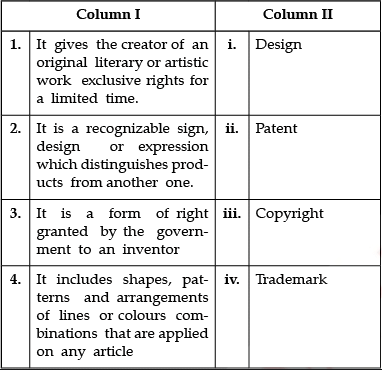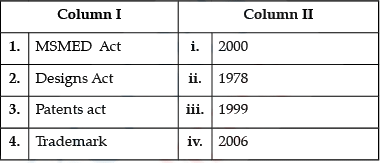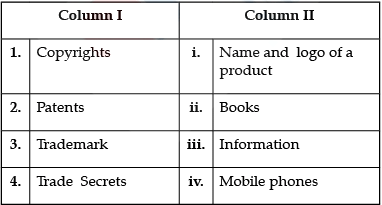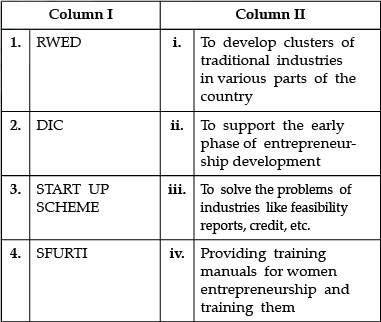Test: Small Business- Case Based Type Questions - Commerce MCQ
15 Questions MCQ Test Business Studies (BST) Class 11 - Test: Small Business- Case Based Type Questions
Direction: Match the features given in column I with the suitable options of IPRs given in column II.


Direction: Ramit is planning to start his business and wanted to know the related Acts and the years they were passed, applicable to his business. Help him in identification.


| 1 Crore+ students have signed up on EduRev. Have you? Download the App |
Direction: Match the IPR given in column I with the suitable options given in column II.


Direction: Match the Institutions given in column I with their objectives given in column II.

Direction: Read the following text and answer the questions on the basis of the same:
Neeru was a daily wage labourer when she decided to be her own boss and transformed herself as a successful businesswoman. She started her small scale business of making Pickles using organic fruits and vegetables with total investment of ₹ 10 lakhs along with few of her neighbors using their free time at home. She invested ₹ 2 lakhs by selling her jewellery and using personal savings and ₹ 6 lakhs were contributed by her friends who are members of her business. They named their venture as ‘Sakhi Aadhaar’. They launched their new range of pickles using aloe vera, turmeric, and other herbs, for boosting immunity of the users. They were able to supply the entire district. One of the members suggested that they should make herbal candies too. The products made by them were well-liked and appreciated by the people.
Q. Identify the quality of Neeru as an entrepreneur in the above case.
Direction: Read the following text and answer the questions on the basis of the same:
Neeru was a daily wage labourer when she decided to be her own boss and transformed herself as a successful businesswoman. She started her small scale business of making Pickles using organic fruits and vegetables with total investment of ₹ 10 lakhs along with few of her neighbors using their free time at home. She invested ₹ 2 lakhs by selling her jewellery and using personal savings and ₹ 6 lakhs were contributed by her friends who are members of her business. They named their venture as ‘Sakhi Aadhaar’. They launched their new range of pickles using aloe vera, turmeric, and other herbs, for boosting immunity of the users. They were able to supply the entire district. One of the members suggested that they should make herbal candies too. The products made by them were well-liked and appreciated by the people.
Identify the essence of entrepreneurship in the light of the given statement.
Q. “...using organic fruits and vegetables with total investment of ₹ 10 lakhs along with few of her neighbours using their free time at home. She invested ₹ 2 lakhs by selling her jewellery and using personal savings and ₹ 6 lakhs are contributed by her friends who are the members of her business.”
Direction: Read the following text and answer the questions on the basis of the same:
Neeru was a daily wage labourer when she decided to be her own boss and transformed herself as a successful businesswoman. She started her small scale business of making Pickles using organic fruits and vegetables with total investment of ₹ 10 lakhs along with few of her neighbors using their free time at home. She invested ₹ 2 lakhs by selling her jewellery and using personal savings and ₹ 6 lakhs were contributed by her friends who are members of her business. They named their venture as ‘Sakhi Aadhaar’. They launched their new range of pickles using aloe vera, turmeric, and other herbs, for boosting immunity of the users. They were able to supply the entire district. One of the members suggested that they should make herbal candies too. The products made by them were well-liked and appreciated by the people.
Q. Entrepreneurship is a process of whose actions?
Direction: Read the following text and answer the questions on the basis of the same:
Neeru was a daily wage labourer when she decided to be her own boss and transformed herself as a successful businesswoman. She started her small scale business of making Pickles using organic fruits and vegetables with total investment of ₹ 10 lakhs along with few of her neighbors using their free time at home. She invested ₹ 2 lakhs by selling her jewellery and using personal savings and ₹ 6 lakhs were contributed by her friends who are members of her business. They named their venture as ‘Sakhi Aadhaar’. They launched their new range of pickles using aloe vera, turmeric, and other herbs, for boosting immunity of the users. They were able to supply the entire district. One of the members suggested that they should make herbal candies too. The products made by them were well-liked and appreciated by the people.
Q. Identify the category of small business started by Neeru according to MSMED Act.
Direction: Read the given text and answer the questions that follow: Sensing the business opportunities in Food industry, Sagar Bagada after completing his graduation in Agriculture engineering, decided to open his own enterprise. His dream turned into reality when his enterprise, “Swaad Food Industries” set up its food and beverages processing plant in ‘Mitrapura’’, one of the rural area of Rajasthan, under Start-up India Scheme launched on 16th January, 2016. The enterprise opted for labour intensive technique, due to easy availability of labour at lower cost. With in no time,he came in the list of successful entrepreneurs.
Q. What is the process of creation of an enterprise known as?
Direction: Read the given text and answer the questions that follow: Sensing the business opportunities in Food industry, Sagar Bagada after completing his graduation in Agriculture engineering, decided to open his own enterprise. His dream turned into reality when his enterprise, “Swaad Food Industries” set up its food and beverages processing plant in ‘Mitrapura’’, one of the rural area of Rajasthan, under Start-up India Scheme launched on 16th January, 2016. The enterprise opted for labour intensive technique, due to easy availability of labour at lower cost. With in no time,he came in the list of successful entrepreneurs.
Q. “The enterprise opted for labour intensive technique, due to easy availability of labour at lower cost.” Identify the need for entrepreneurship satisfied in the given statement.
Direction: Read the given text and answer the questions that follow: Sensing the business opportunities in Food industry, Sagar Bagada after completing his graduation in Agriculture engineering, decided to open his own enterprise. His dream turned into reality when his enterprise, “Swaad Food Industries” set up its food and beverages processing plant in ‘Mitrapura’’, one of the rural area of Rajasthan, under Start-up India Scheme launched on 16th January, 2016. The enterprise opted for labour intensive technique, due to easy availability of labour at lower cost. With in no time,he came in the list of successful entrepreneurs.
Q. Start-up India Scheme was launched on ____in the year ______.
Direction: Read the given text and answer the questions that follow: Sensing the business opportunities in Food industry, Sagar Bagada after completing his graduation in Agriculture engineering, decided to open his own enterprise. His dream turned into reality when his enterprise, “Swaad Food Industries” set up its food and beverages processing plant in ‘Mitrapura’’, one of the rural area of Rajasthan, under Start-up India Scheme launched on 16th January, 2016. The enterprise opted for labour intensive technique, due to easy availability of labour at lower cost. Within no time,he came in the list of successful entrepreneurs.
Q. As a successful entrepreneur, identify Sagar ’s contribution to the economy is:
Small scale industries are smaller than cottage industries.
For establishment of small scale industries we need huge amount of capital.
Government step up for establishing small and cottage industries.
|
37 videos|142 docs|38 tests
|
|
37 videos|142 docs|38 tests
|

















